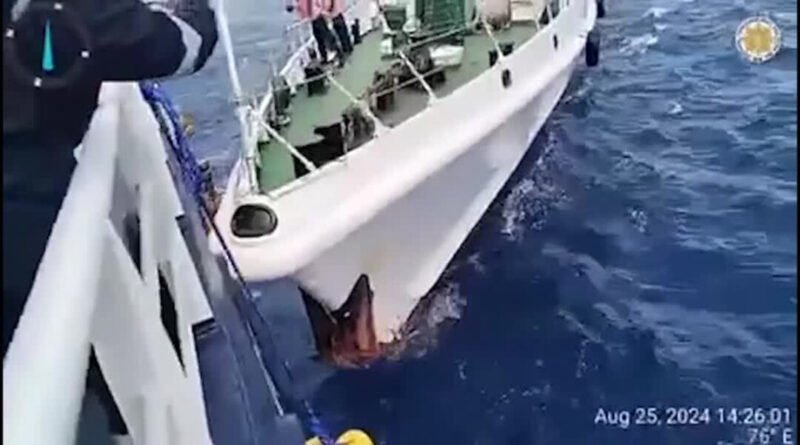中国和菲律宾海警船在争议水域相撞
Beijing and Manila traded blame over the collision.
Chinese and Philippine Coast Guards have blamed each other following a vessel collision on Sunday in the latest flare-up in the disputed South China Sea.
According to Philippine officials, the incident occurred on Sunday afternoon when the Philippines’s BRP Datu Sanday (MMOV 3002) was on its way to “resupply Filipino fishermen with diesel, food, and medical supplies.” The vessel’s engine failed following the collision.
The Chinese Coast Guard accused MMOV 3002 of deliberately colliding with a Chinese vessel, while the Philippines said the Chinese Coast Guard’s attempt to encircle and block the Philippine vessel led to the collision and published footage of the incident.
In two statements published on Chinese social media platforms, Gan Yu, the spokesperson for the Chinese Coast Guard, said MMOV 3002 had “intruded” the sea area near Sabina Shoal in the Spratly Islands despite warnings from the Chinese side.
Gan claimed MMOV 3002 caused the incident by approaching a Chinese Coast Guard vessel “in a dangerous manner and deliberately charging into it,” adding that the Philippines should take full responsibility.
Gan also reiterated the Chinese regime’s territorial claim over the Spratly Islands and the surrounding sea areas, and warned the Philippines against what he called “intrusion, provocation, smearing, and sensationalizing.”
The National Task Force for the West Philippine Sea (NTF-WPS), an interagency task force consisting of the Department of National Defense, the Armed Forces of the Philippines, and the Philippine Coast Guard, said Chinese vessels had “attempted to encircle and block” the Philippine vessel and “made close perilous maneuvers that resulted in ramming, blasted horns, and deployed water cannons” against the Philippine vessel, eventually leading to its engine failure.
“These unprofessional, aggressive, and illegal actions posed serious risks to the safety of the Filipino crew and the fishermen they were meant to serve. Despite these provocative maneuvers, the crew aboard the BFAR [Bureau of Fisheries and Aquatic Resources] vessel maintains high morale and remains safe and unharmed.
“Claims suggesting that our personnel fell overboard and were subsequently rescued by the Chinese Coast Guard are completely unfounded,” the NTF-WPS said, adding the “misinformation serves as a clear illustration” of the Chinese regime’s “willingness to distort the truth and engage in disinformation to bolster its public image.”
“We are steadfast in supporting our [Philippine] #FriendsPartnersAllies,” she wrote.
The incident occurred over the Scarborough Shoal in the South China Sea, a 58-square-mile atoll that has been the subject of a years-long dispute between the Philippines and China.
Philippine fishermen frequent the atoll, a chain of reefs about 220 miles from Manila. However, China views the territory as its own and regularly makes its military presence known in the area.
In 2016, the Permanent Court of Arbitration in The Hague ruled in the Philippines’s favor over its dispute with the Chinese regime in the South China Sea. Beijing rejected the ruling and continues to claim ownership over the territory.
The Chinese regime claims nearly the entirety of the South China Sea as its own, antagonizing neighboring countries including Vietnam, Brunei, Malaysia, and Taiwan, which rely on the region for fishing and trade. About $3 trillion worth of annual trade passes through the South China Sea, and the waterway is believed to be rich in oil and natural gas deposits.
Catherine Yang contributed to this report.





